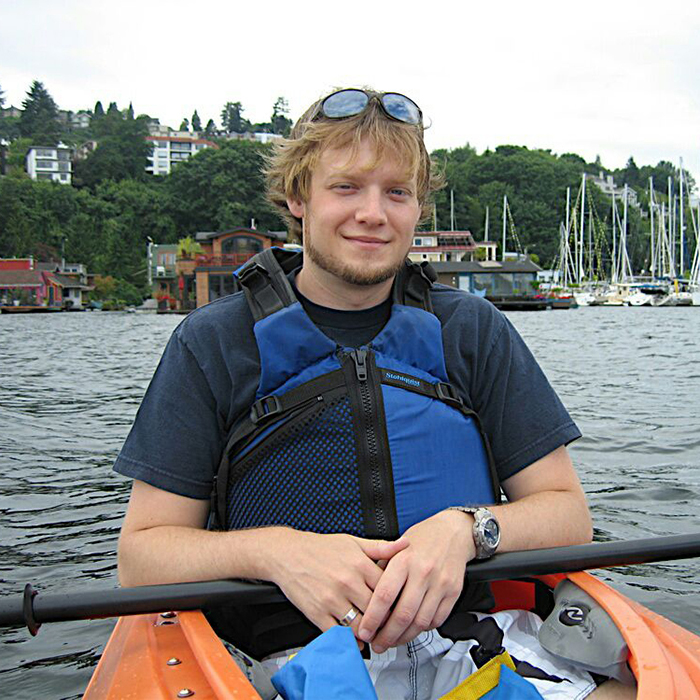Alumni Profile: Chris Nelson
Chris Nelson (MSE 2006) first became aware of the Software Engineering programs at Carnegie Mellon when he was an Associate Member of the Technical Staff at Siemens Corporate Research, where he worked with researchers who published papers and books with Software Engineering professors. In his current role as a Software Development Manager at Amazon, Chris remembers that his interest in the program was further piqued when Matthew Bass, currently the Associate Director of Software Engineering Professional Programs for Corporate and Alumni Relations and Teaching Professor at the MSE, joined the Siemens staff in 2003.
Working with Matt, Chris was introduced to more formal techniques for understanding software architecture. Prior to that, software had been more craft and less science. It had been a matter of “how clever can you be.” And through numerous conversations with Matt about the MSE program, Chris quickly realized that the MSE program could teach him a more systematic approach to the design and implementation of software solutions beyond the project level. Additionally, he felt CMU’s reputation for seminal research in Software Engineering and training numerous world-class software professionals would only add to his own credibility and accelerate his career to new heights.
What Chris didn’t anticipate was just how much more he would take away from the MSE program. As well as a more thoughtful approach to software design, Chris learned project and team management skills while working on the Studio project. He feels the most important aspect of the process was learning how to “deliver results and goals through a collection of resources.” Although it was a skill he had not anticipated acquiring, it was one that played to and enhanced his natural strengths, and one that he had a tendency to naturally gravitate towards. “In order to be successful and rise to the top in any organization, you eventually have to know how to get things done not just through your own efforts but through other team members as well. Learning how to leverage human and technical resources in the course of a software development project is something the program teaches through the project extraordinarily well.”
Strengthening those management skills helped him to accelerate his career and “keep it on a higher trajectory.” After graduating from the MSE program, he was hired as a Program Manager at Expedia where he quickly worked his way up to Manager of Program Management, “roles that were about getting things done through other resources.”
As a part of “getting things done through others”, Chris attributes much of his recent success to the communication skills he acquired in the MSE program. “The Technical Communications course we had to take every semester: I think that if you take that course to heart and really work on those assignments, it will take you leaps and bounds forward in how you manage your communications with others.” He feels that “the ability to have technical conversations with not only the engineers, but peer managers, senior managers, director, all the way up to the VP” is essential to a successful career. Knowing how to communicate effectively with all of the stakeholders greatly improves the success of the project you work on, and, in turn, your career.
In his current position at Amazon, he has seen his communication skills payoff. “Within my first six months at Amazon I gave a presentation to my senior vice president, an opportunity very few people have. Afterwards, I received feedback from a couple of the principle engineers who said that they thought it was one of the best presentations they had seen delivered to our senior vice president. I attribute most of that success to the Technical Communications course, as well as the focus on the End of Semester Presentations as part of Studio.”
“If you want to be an Agent of Change, communications skills are critical. You have to understand how to talk to people, how to persuade them, you have to understand where they are coming from and what they will be listening for. If you want to be a leader, in any way, you need to be able to communicate to the people who are going to follow. You also need to be able to communicate with other leaders in order to be successful. If you just want to code, communication doesn’t really matter. But, if you want to be any sort of leader, communication is critical.”
When not driving remarkable results from cutting-edge project teams at Amazon, you’ll find Chris outside. This past winter he took a weeklong trip to Alaska for a backcountry snowboarding expedition. “It was gorgeous. A complete bluebird day; the sun was shining, the snow was soft.” The day consisted of ten runs of 1,000 to 1,500 vertical feet. Fortunately, he did not have to hike to the top of the run. All of the boarders were transported to the top in a snowcat, a truck-sized vehicle on tracks that is used to groom trails. Then one by one, for avalanche safety, the boarders descended the mountain.” Chris’s education didn’t end with a master’s degree in Software Engineering, he is also certified in avalanche safety!
So, whether he is leading a backcountry expedition or leading IT development at one of the world’s most influential businesses, Chris continues to drive himself and those around him to the next level; a lesson he learned, in part, during his time in the MSE program.
